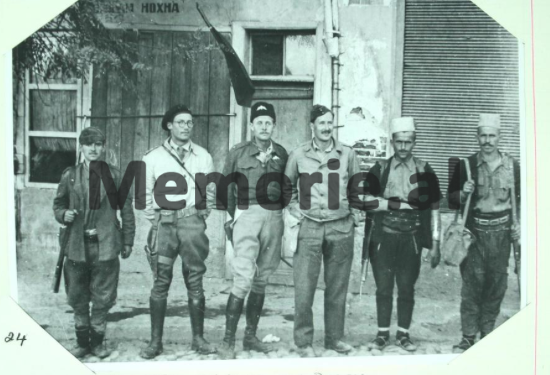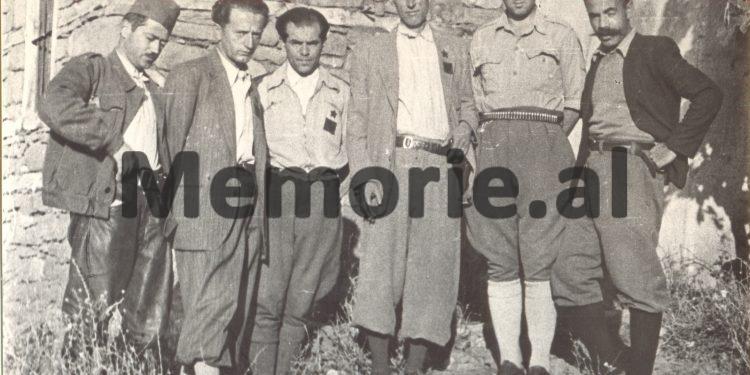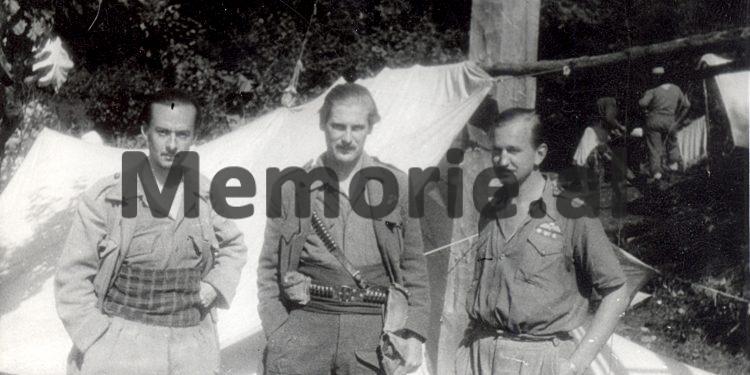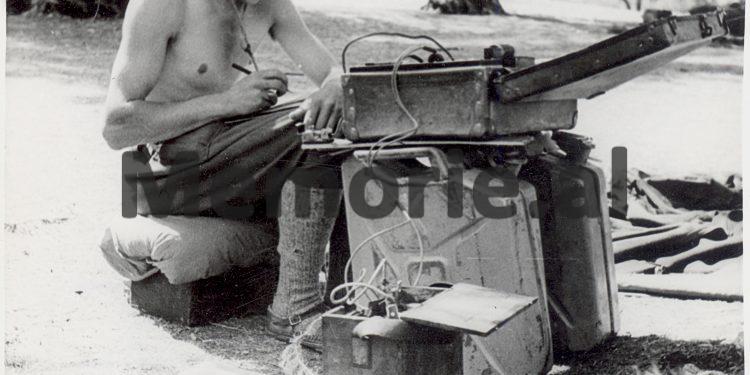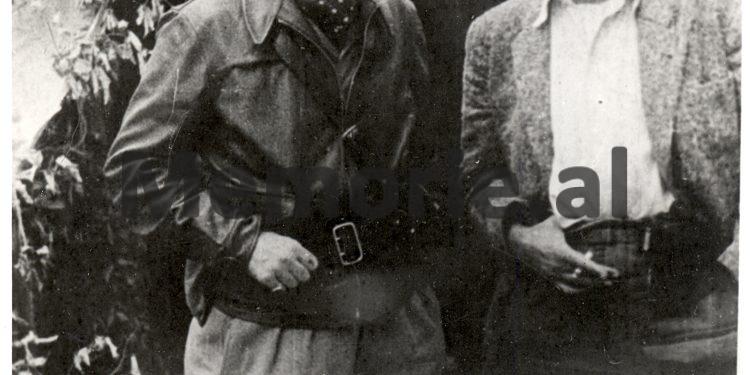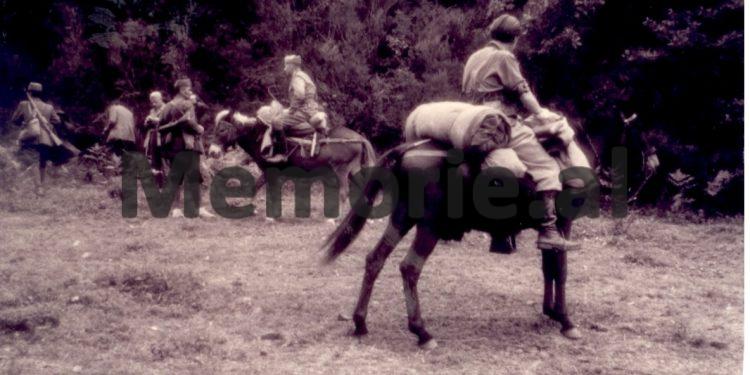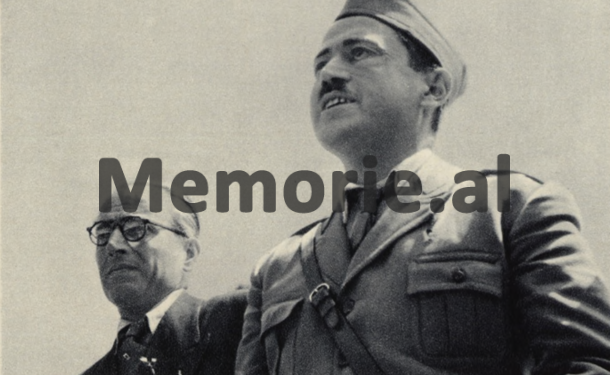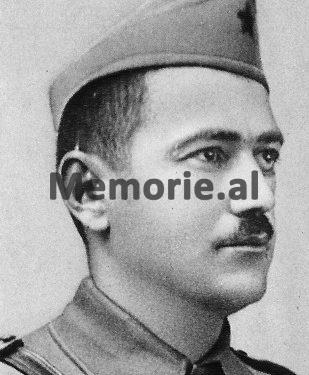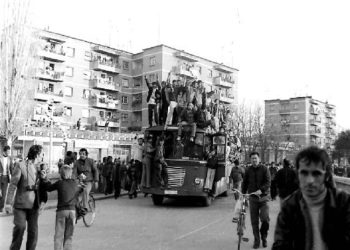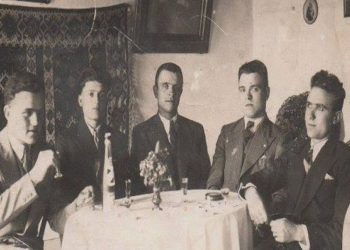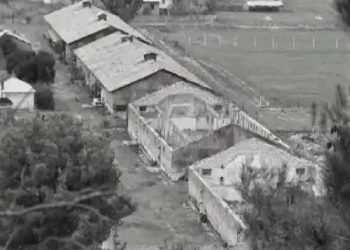Dashnor Kaloçi
Memorie.al publishes the unknown story of the British mission led by Lieutenant Andy Handaz, who in the summer of 1943, by order of Haxhi Lleshi, took refuge in the house of Bajram Zeneli in the village of Ternovo in Dibra. According to the memories of the man who accompanied for several months and served the British military, the head of that mission, Lieutenant Handz, had a map where all the toponyms of that area were marked …!
“During all that time I served near that mission led by Lieutenant Handz, I had the opportunity to travel with him through the mountains of Dibra, Martanesh, Shëngjergji, wherever they went to fulfill their duties. Also, during that period of time, when we were moving in the region of Dibra, Tirana, Kruja, etc., I had the opportunity to meet and talk (with translators) with many other British soldiers of other missions, such as: Maklin, Smajl, Dafi et al. Among these meetings I want to mention our trip on the itinerary: Tërnovë-Kodra e Lakesve on Gollobic-Katundës-Kalore (old road) -Vrame-Kazaik-Valikardhë-Qafë-Buell-Dragu-Shilgjetë-Teqe e Madhe (at Sheh Aliu) -Komavec-Gjuras (at Kroi i Bukës) -Bllacë (at Jashar Zeneli) -Kandër-Muhërr-Katër Grykët-Selishtë-Lurë-Reç-Dardhë-Sllovë-Vlesh and Kala e Dodës. During this trip, we stopped somewhere and Lieutenant Handz pulled out a map from his military bag that he always carried with him and said: “This place is called, Pellazg-mal”. This is written, among other things, in the memoirs of Bajram Zeneli, originally from the village of Tërnovë in the Municipality of Zerqan of Dibra, who in 1943-’44, was appointed by Haxhi Lleshi to accompany a British military mission that was “accredited” near the partisan headquarters headed by Haxhi Lleshi in the district of Dibra, and for several months kept them in his house. In addition to being assigned for several months to serve near the British allied mission, Bajrami participated with weapons in hand in several actions and fighting conducted under the command of Haxhi Lleshi. Bajram Zeneli passed away in 1989, (at the age of 113), leaving as a family legacy, hundreds of pages of memories from his life, where a special place is occupied by those with the British mission, led by Lieutenant Andy Handz , which he sheltered in his house in 1943. Some of these memoirs that Memorie.al is publishing in this article, were given to us to publish, by his son, Enver Zeneli (subject teacher of history), some time before he passed away.
British mission to our home
In August 1943, an allied British military mission led by Lieutenant Andy Hanz entered the district of Dibra and settled in the village of Trnovo in the municipality of Zerqan. At the time the news came that the British mission had reached the Epra Mountains of Tërnova (in Fushë e Zogut) the partisan forces of that province, commanded by Haxhi Lleshi, were operating on the Dibër-Struga road. Those who brought this announcement about Haxhi Lleshi, were the partisan Sali Osmanlliu (a well-known man of our house) and R. Tafa and K. Biba. When it was three o’clock in the morning, Haxhi Lleshi with some partisans arrived at our house and met with my brother, Asllani, whom he told to fix and clean the men’s room well, as he would introduce some Englishmen who were coming. Although the women did not happen to be at home, with my help, in a few minutes the room was ready and everything was shining. The English came there accompanied by Qazim Prishtina, who after taking some corn in the garden, cooked them well and distributed them first to distant friends and then to Haxhiu and the rest of us. After the English were well rested in the newly arranged room, we were provided with a white and brown drumstick. Then they were arranged in rooms. The three British officers with Lieutenant Handz at the head and their translator Qazim Prishtina, in the guest room, and Lik bej Toptani, the partisan translator in the room of my brother, Asllani. But Lika also went to the chief, Tet Cami, where the partisan headquarters was located. We left the corner room under the tower for cooking, while the partisans slept in the tower room. We of the house were forced and went outside, sleeping in huts on the dry grass. Not only outside the tower, but also in the hallway and on the balcony, there were constantly armed partisan guards.
Haxhi lleshi assigned me to the English
As the main person in charge and guardian of everything, I was assigned to this Military Mission, which came to us in Albania as an element of the world war against Nazism. According to the command of the National Liberation War of Dibra, and mainly, Haxhi Lleshi, my task near this mission was: sheltering them in my house, caring for them in the traditional way of Dibra, building several barracks, meeting the vital needs for them in this difficult but very generous area, extremely high correctness, as well as the avoidance of any kind of inconvenience that might come to them from that foreign environment where they would spend some time. All this, not only me who was assigned that task, but as the members of that mission themselves, the National Liberation War Command of Dibra and all the other friends and benefactors who had the opportunity to meet and work for them, have expressed, and we fulfilled that task best. At the request of Lieutenant Handz, and I built a camouflaged barracks for them in the woods, just as I had built it for the partisans next to our house. One day Handz-y said to me: “I see you very upset, what do you have”?! I replied by saying that he often moved and left without the knowledge of his comrades, translators, partisans and mine, who was in charge of securing their lives! When I told him ‘without my permission’, he put his lip to the gas, but then promised me that he would change his behavior, and that he did it not for the partisans, but only for me. During that conversation, Handz-y told me: “Mr. Bajram, let me give you some advice as a freedom fighter that you are. When the communists start killing each other, beware, even too much, that from excessive spending on raising awareness, their economy will have shrunk to zero. And the capitalists will spend for the economy, because there is no conscience on an empty stomach. And something else: The greats of the Antifascist Coalition, have signed such a division: The East will fight for communism, that is, for conscience, while the West, will fight for capitalism, that is, for the economy. Communism will collapse, pray it collapses without war, I pray it collapses without war. As much as you can, since you are a war of liberation, fight for Albania and the Albanians to lean forward and join the West (economy) to pass to Switzerland. If you stay with the East (with communism) the river has taken you …”
Andy Handz, head of mission
In addition to the two translators, the General Command of the National Liberation Army had several other personnel serving with that mission. Throughout that period, I served near that mission led by Lieutenant Handz, I had the opportunity to travel with him through the mountains of Dibra, Martanesh, Shëngjergji, wherever they went to fulfill their duties. Also, during that period of time, when we were moving in the region of Dibra, Tirana, Kruja, etc., I had the opportunity to meet and talk (with translators) with many other British soldiers of other missions, such as: Maklin, Smajl, Dafi et al. Among these meetings I want to mention our trip on the itinerary: Tërnovë-Kodra e Lakesve on Gollobic-Katundës-Kalore (old road) -Vrame-Kazaik-Valikardhë-Qafë-Buell-Dragu-Shilgjetë-Teqe e Madhe (at Sheh Aliu) -Komavec-Gjuras (at Kroi i Bukës) -Bllacë (at Jashar Zeneli) -Kandër-Muhërr-Katër Grykët-Selishtë-Lurë-Reç-Dardhë-Sllovë-Vlesh and Kala e Dodës. During this trip, we stopped somewhere and Lieutenant Handz pulled out a map from his military bag that he always carried with him and said: “This place is called, Pellazg-mal”.
Handz, is interested in the toponyms of Dibra, etc.
As we continued our way to the village of Grama, a friend of mine, named Jonuz Shehu of Vleshë, approached us and greeted us. As soon as we met him, Lieutenant Handz opened the map again and, addressing Jonuz, said: “Grama, Radomira, like all of Albania, are Pelasgians. “This place has been mentioned since ancient times for silver mines.” Jonuz Shehu begged us to spend that night in his stalls, but Lieutenant Handz, after thanking him for the hospitality, told him he could not, as he had the time planned and they had to travel for the whole night. Although Jonuz knew that I knew the way well, to guide distant friends, he sent word to a friend, who came and along with Jonuz, continued the journey with us. After passing Skërtec, we stopped somewhere on the side of Cerian, where Handzi opened the map again and, pointing, said: “Ferru, (iron) is here”. We continued our journey, climbing to the top of the castle of Xhitet (Qyteza), we went out to Bellova, the hill of Krapa and arrived at Llixhat. Even there at White Water, Handz-y opened the map and placed some pencil marks on it. After staying there for a while, we went to Faik Shehu and Jashar Bunguri, who knew English quite well, having served for some time as a translator for several other British Allied missions. Our journey continued further from Peshkopia to Grazhdan and Maqellarë, where we went to the house of Fiqiri Dine begut. Fiqiri knew English well and his conversation with Lieutenant Handz continued at length. From Maqellara we went to Homesh to Demallarët, and then to Zerqan to Qamil Shehu, and to Përvizët. Jonuz Shehu stopped in Zerqan, while I and the others continued on our way.
Handz-y lowered the communists in talks with the nationalists!
We went to Kodra e Thatë and there we met Haxhi Lleshi and Baba Faja (Mustafa Xhani), with whom we talked and the place was set where the other barracks for the English allied mission would be built. We all went out together to Vorret e Vrame and from there to my house in Tërnovo. While I was staying with distant friends, talking about various problems, other partisans led by Muntaz Kodra, went to my sawmill, to prepare the necessary timber we would need to set up other barracks. During those days of stay in Tërnova, Lieutenant Handz managed to bring in talks, Haxhi Lleshi and Baba Faja, with the leaders of the Dibra parish, such as: Dan Kaloshi, Fiqiri Dine, Hysni Dema, Halil Keta, Mahmut Përvizi, etc. At that meeting, although they had given the floor to Handz, neither those of Lura with Halil Halina nor those of Muhurr came. From the beginning of the meeting, the conversation started with romuse, known as the subtle allegory characteristic of Dibra. But the nationalists did not resist, as Haxhi Lleshi was well acquainted with speaking in Romans and remained very calm during the talks. “In order not to deal with small things, we are going to the big ones that interest us. We want weapons “, they addressed the parish of Dibra, the British allied mission. “You are not unarmed, when you entered, I noticed that you handed it over to the owner of the house. “Join each other in the war and with the Allies, and when you run out of weapons, you ask Haxhi Lleshi”, said the British missionary, Lieutenant Handz. At this time, I intervened and said: The liberation of Zerqan, the war at Sofraçan Rock, and others like these, are not small things. In terms of size, they leave nothing to Korabi ‘. But the quarrels of different individuals in their preferences, the deviation of the party from the main issues, the statement of the British lieutenant, Handz, that: The anti-fascist coalition has divided the spheres of influence in the Balkans, aroused a lot of long discussions and debates. While the conversation was going on in a high tone, someone from the pariah said: “Weapons oh the master of the house …, because maybe someone kills us …”!? I immediately intervened and said that even though we were at war, every possible event within the borders of my village, the owner of the house’s bad, ask him. I had taken all measures so that nothing would happen to any of the men who were meeting with each other about the problems of the war. Next to me were other churches such as: Sali and Rakip Tafa (Zeneli), Halil Hasa, Bajram Gjika, through whom and other relatives from Zerqani and Okshtuni, accompanied by some partisans, I had occupied all the paths to enter in Trnovo.
Sharing with the British mission military
The Allied missionary, Lieutenant Handz, was quite agile, but his large, white horse did not make him an almond. The mission radio communicator was constantly communicating with his radio and had carefully placed the antenna on top of the large walnut tree in our backyard. The radio operator spoke only with Lieutenant Handz and in his absence, with two translators, never with only one of them. Radist never ate food without first tasting Miltiazi, not even when cooking it himself or Miltiazi. During all those days that I was on duty near that allied mission, I was particularly impressed by Lieutenant Handz’s great interest in the toponymy of the places we traveled, in particular in the Dibra region, as well as the notes he made in his map occasionally. Likewise, one of the other special events that I remember, was the one when the radio announced the capitulation of fascist Italy. Lieutenant Handz, Miltiazi, the radio operator and others, combined their great joy with our joy there in Trnovo. After a few days, Lieutenant Handz and the other members of the mission, accompanied by Qazim Prishtina, Muntaz Kodra, Asllan Zeneli, etc., together with the Gryka e Madhe Çeta, went to Sheher (City of Dibra e Madhe). And I with the radio operator Miltiazi, the translators, and some other partisans, stayed there, waiting for Haxhi Lleshi to come from Labinot. Accompanied by translator Qazim Prishtina and several other partisans, Lieutenant Handz returned to Trnovo. Through translator Lik bej Toptani, he lodged a complaint against Muntaz Kodra and Luan Zelka. I resolved the complaint (it was about four boxes of biscuits that two partisans had unknowingly taken from their ration), in the presence of two translators and then by order of the commander of the partisan forces in that area, Haxhi Lleshi, I accompanied the group of English missionaries to him. When we arrived in Sheherr, I talked to Haxhi Lleshi about the complaint submitted by Lieutenant Handz, as well as the solution I had made. After handing over the allied mission in good health, I greeted them and returned alone to Tarnovo. The next day I continued my way to meet the partisan forces towards Kruja.
Conversation with academics, Buda, Çabej and Domi, about the toponyms of Dibra!
The long period of stay with the British allied mission, and in particular with Lieutenant Handz, who was quite given to the toponymy of those parts, seems to have left a deep impression on Bajram Zeneli from Dibra, even for many years after the end of the War. This can be seen in his memoirs, where among other things he writes: “The time of my stay with the English mission and in particular with Lieutenant Handz, continued to tickle me even long after the end of the War. Based on this, in the late ’50s and early’ 60s, I went to Tirana several times to talk to some of my old friends with school and scientific knowledge, such as: Alex Buda, Eqerem Çabej, Mahir Domi etc. I first met with them separately, and then reunited them all at the home of my old friend, Jamal Vorbs. There I also called my old friend, the well-known teacher, Jorgji Pano. After being told in detail about the long journey I had made during the War years with the British mission, and Lieutenant Handz who knew a lot about the places and toponyms we passed, I asked them to give me their scientific opinions, for some from the names of those places that Lieutenant Handz had once told me. Even though I was a schoolless person, they valued and respected me as a beaten man by life. They approved all those things that Lieutenant Handz had once told me, supplementing them with other scientific data on the toponymy of Dibra. According to those prominent academics, the old name of Tërnova was: Drena, and then Tra (h) na. Both names are indigenous. Later it was called Trenova, while in the Ottoman records of 1467, it appears as Drenova. Tornova and Trenova, on the other hand, are two names of the Serbo-Slavic administration, still pronounced by the locals (Albanians). While the village of Katunes (Katundës) is the name of an early Pellazgo-Illyrian-Albanian settlement. Over this early settlement, (today ruins) passes Kalorja, (very old road) Dibër-Tirana-Krujë etc., and vice versa. Also, Martanesh, Valikardh, Zerqan, Sopot, Dragua, (Dragoi), Shilgjet, Gjuras, (Guras), Kroi i Bukës në Gjuras, Dardhë, are the names of autochthonous countries (Illyrian-Albanian). Qafa e Buallit is also an Illyrian-Albanian name, like the name Vajakal. It has been Qafë bollë (neck, the place where bollas pass (from Klosi and Bulqiza), ie reptiles (non-venomous snakes), such as Vitoria, Breva, etc. Bolla, where o has given u-in (o: u), bollë, bullë, Qafë e Bullit (today’s name); When I told those honorable academics that Lieutenant Handz, pointing to his map, uttered the word Pellazag from time to time, they looked at each other in astonishment and They got up and hugged me, explaining that “Pellazg” is our old name. From the Pelasgians, come the Illyrians and from the Illyrians to the Albanians. First, the name “Pellazg” – the mountain of that place in the Castle of Doda, ( Radomirë) of Dibra, is irrefutable evidence of our origin from the Pelasgians, and secondly, even in that mountain called “Pellazg” -mountain, lived, lived and worked our ancestors, the Pelasgians, who extracted and processed from that part of the earth the silver metal.So there is the location of a very ancient silver mine, probably from the time of the Pelasgians.Also they s They also explained about the origin of the name Krap (e), which is a place above the Spas of Peshkopi and the road Krape that leads to Bellovo towards the old Xhiteza (Qyteza) old castle. Carp is an Illyrian name. Carp that ruined the Avalanche (this word comes from the legend you just told about Eid, but also from the etymology, origin, and history of the word has to do with a city of Illyria. Undoubtedly the name “White Water” is of ancient origin “Our conversation and discussions about the toponyms of some places in Dibra would take a long time, as if the people of Xhemal Vorps’s generous house did not force us to sit at the table they had filled with all the goodies.”
The story of the Zeneli family, from the military of the Monarchy, with Haxhi Lleshi in the partisan ranks!
According to the memoirs and testimonies of Enver Zeneli (former history teacher), his father, Bajram Hysen Zeneli, was born in 1886 in the village of Tërnovë in the municipality of Zerqan in the district of Dibra, in a well-known family of that three. In 1916, Bajrami was the commander of the Tërnova gang, which fought against the Serbian forces that invaded the Albanian lands of that area. Before Eid, that gang was led by his uncle, Osman Zeneli. During the years of the Zog Monarchy, Bajrami’s brother, Beqiri, was educated in one of the military academies of Italy. After returning from Italy, he served for several years until April ’39, near the Royal Court of Zog in Tirana, being one of his loyal people. While Bajrami’s other brother, Asllani, who had graduated from the Officers’ Training School in Tirana, for several years served as an officer in the Royal Border Guard post at the Three Bridges post in the Përmet district. After an incident, he was arrested and sentenced to be hanged by King Zog, but then with the intervention of MP Sali Vuciterni, his release became possible. During the years of the Nazi-fascist occupation of the country (1939-’44) the whole family of Bajram Hysen Zeneli, connected with the Anti-Fascist Movement and their house in the village of Tërnovë of Zerqan, became one of the main partisan bases of that province, where sheltered Haxhi Lleshi and other well-known cadres of the War. Due to that, as well as its good economic situation (that house owned two sawmills – which worked with the force of water to cut timber), there was sheltered for several months, another British allied military mission led by Lieutenant Andy Handz. Asllani joined the Golloborda Çeta, partisan formations, etc., while Bajrami, in addition to being assigned for several months to serve near the British allied mission, participated with weapons in hand in several actions and fighting conducted under the command of Haxhi Lleshi. Although he made a significant contribution during the war, after 1944, Bajrami devoted himself to his craft as a master and technician of wood processing, setting up several carpentry lines in Dibër, Krujë, Laç and Tirana. Bajram Zeneli passed away in 1989 (at the age of 113), leaving as a legacy to the family, hundreds of pages of memories from his life. A special place is occupied by those with the British mission, led by Lieutenant Andy Handz, whom he sheltered in his house in 1943./ Memorie.al




